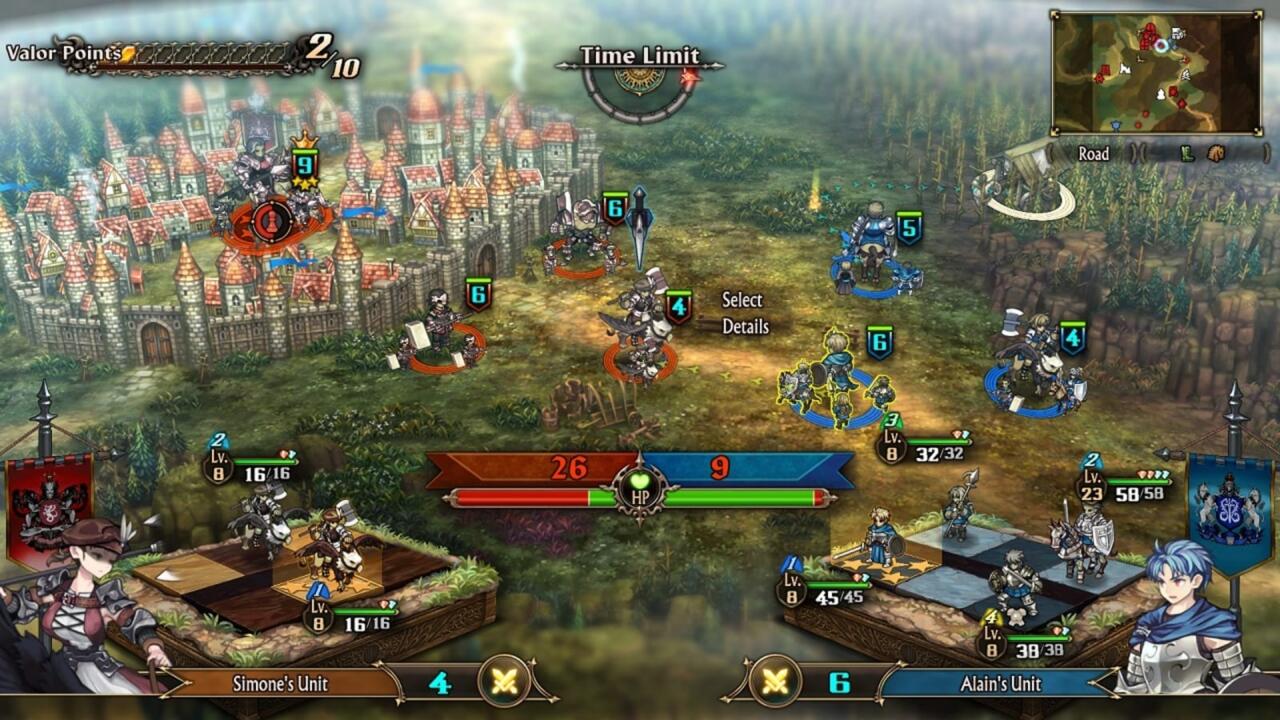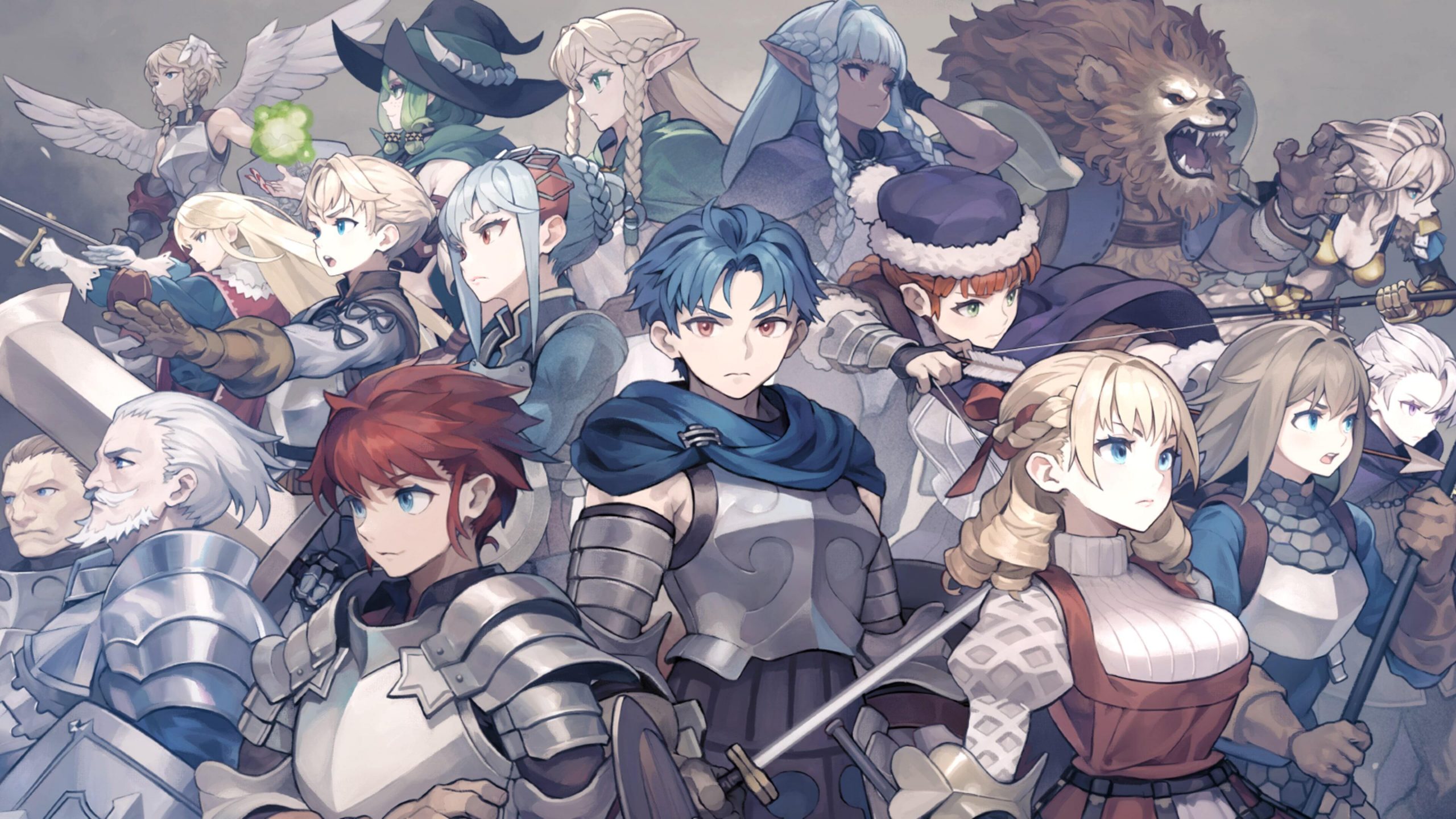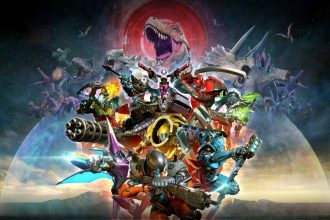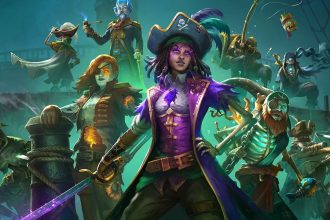There are few gaming experiences more engrossing, engaging, and satisfying than a quality strategy-RPG. They offer the joy of building up a little ragtag army, bit by bit, into a gang of storied warriors with precision-specialized skills; the tension of seeing what sort of wrenches the next combat stage will throw into the mix; the utter thrill of eking out a victory with a wild strategy–or having an army that works so well together that they lay waste to all before them. Unicorn Overlord, the latest collaboration between developer Vanillaware and publisher Atlus, seeks its place among strategy-RPG royals–and, despite a few small missteps, lays claim to an honorable spot among its peers.
In its narrative, Prince Alain was spirited off to a faraway island a decade ago as his mother, the queen, was deposed from her throne by the wicked tyrant General Valmore and the Zenoiran Empire. Now, the Empire has all but conquered the continent of Fevrith, and an older Alain sets out to reclaim his throne and liberate the populace from their oppressors, all while bolstering the ranks of his Resistance army. But a mystery lies at the heart of everything: How did the Zenoiran Empire conquer all of the kingdoms so easily? Is there a much darker power at play?
The visuals in Unicorn Overlord dazzle right from the opening cutscene, with Vanillaware’s well-loved 2D art bringing a detailed fantasy realm to life. There are a great many characters and environments throughout so there’s plenty of variety to the eye candy–but even if that hadn’t been the case, it would be hard to draw your eyes away from the attractive character designs, exquisite backgrounds, and weighty battle animations that are there. Occasionally, things can get a bit cluttered and confusing–some parts of the UI are messy to navigate–but after a while, it becomes no big deal.
You can’t just stare at the pretty visuals, however–not while evil is afoot. Fortunately, if you want to take your time with seeing all the game’s sights, you can go straight through the crucial story battles, or stop and do all manner of side-questing. Taking the time to explore and help those in need is a good idea, too: When you begin Unicorn Overlord, Prince Alain’s army consists of a handful of close companions, and it feels like the entire world is against you. Only through fighting small skirmishes, liberating towns, forts, and cities from their Zenovian captors can you gradually reclaim territory. Many of these places are decimated from years of war and neglect–but the prince can bring the materials needed to repair the damage, often with a bit of careful overworld exploration. As you do this, your Honors and Renown grow, and you can recruit and hire more soldiers for your army–as well as expand the number and capacity of your current units. It’s a fun gameplay loop that encourages you to explore and rebuild.
But ultimately, games in this genre live and die by how fun the actual strategy and combat is, and Unicorn Overlord passes this test with flying colors. Battles are a mix of real-time unit movement and turn-based battles that play out whenever two units engage one another. Unlike many other games in this genre, each unit consists of a group of up to six different characters, arranged in a 2×3 grid. A designated leader determines elements like map movement speed and what kind of assistance they can provide allied units: If you want to move fast to intercept an enemy or conquer a garrison, a cavalry leader is an ideal choice, but if you want to be able to provide combat spell or projectile backup to a nearby squad then you’ll need an archer or magic user leading the way.
Movement and positioning is critical, since many fights revolve around taking control of key areas on the map–usually towns, forts, watchtowers, or other structures–and using them as recovery, defense, and deployment stations. Sometimes you’ll be blessed with devices like catapults and ballistas that a unit can man and cause serious damage with–if the opposing army doesn’t get there first and cause you a massive headache. Buildable barricades and traps can hold forces at bay while you muster strength, but a winged unit can fly right over them without a care. Finally, stamina determines how many times in a row a unit can attack, be attacked, or assist–run out of energy and that team can’t move until they rest for a while. There are so many options and factors to consider when it comes to something as simple as map movement, allowing you to devise your own unique approaches to combat. When an allied and enemy unit engage, the view switches to a side-view, turn-based battle that plays out automatically. Units will take turns attacking and using skills based on the abilities and criteria you’ve set for them.
The characters themselves come in a variety of classes, each with its own unique traits, abilities, and weaknesses. For example, a Hoplite is a tremendous tank that can significantly reduce damage from many physical attacks and protect other characters, but they suffer when up against defense-lowering Housecarls and armor-penetrating magic users. A spear-wielding Knight cavalry unit can attack a row of enemies at once, while a similarly mounted Radiant Knight is strong against magic, but both are vulnerable to weapons and skills targeting horse-riders. When crafting units, you can carefully concoct a balanced mix of defense, offense, mobility, and support–or you can go all-in on an ultra-specialized team designed for a singular purpose. Weapons and accessories can grant extra boosts and abilities to individual characters, which you can then further customize by setting specific criteria for when and how skills are used in battle. Micromanaging so many factors can be very daunting at first, but Unicorn Overlord is excellent at encouraging experimentation and discovery, and it offers you myriad opportunities to test out new units or character builds outside of key battles.
Team-building is a delight, but what also helps keep your attention rapt is how the combat scenarios you face keep on evolving throughout the game. Besides adding elements like new units and assorted traps and hindrances over time, the unique scenarios of major story battles often present surprises that require you to change your approach. You’ll just be marching along, only to be greeted by a siege of surprise reinforcements, or perhaps a new ally drops in and wants to help–or needs your protection. And maybe, just maybe, that enemy general can be reasoned with if you have the right person speak to them.

Unicorn Overlord’s combat is the standout element of the game–which is good, because it manages to carry the weight of a disappointing story. If you’ve played any RPG where a group of rebels reclaims the land from a despot with the powers of darkness fueling him, you probably know where the story is headed. I frequently found myself wishing that the cutscenes were less frequent and wordy so I could get back to the fun of moving a bunch of little guys around a map. The individual characters aren’t much better, with one-note personalities and motives that don’t offer much in the way of development or interesting interactions. There’s a whole affection system among characters that opens up brief little side conversations when relationships reach a certain point, but even these typically fail at making the characters appealing beyond mere utility like “that dude looks cool and hits like a truck, so maybe I’ll use him more.”
But even though the story is lackluster, the core gameplay of Unicorn Overlord is more than compelling enough to make you want to see the story of Prince Alain to its conclusion. There’s so much satisfaction and gameplay depth here to sink your teeth into that you may find yourself thinking deeply about the game’s team dynamics even when you’re not playing. When the primary feeling a game leaves you with is wanting to play more of it, you know you have a gem on your hands.









